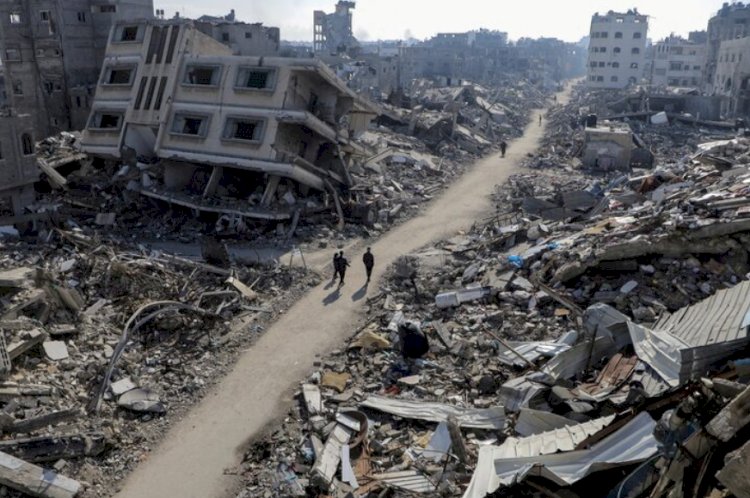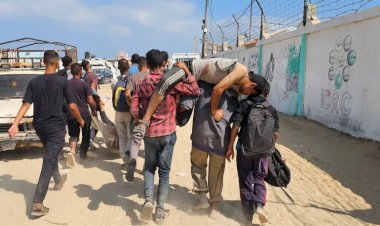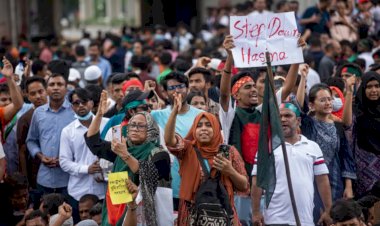A Year of Unrelenting Conflict: The Humanitarian Crisis in Gaza
It has been a year since the deadly conflict between Israel and Gaza reignited, marking a tragic chapter in the lives of millions of Palestinians. What began as Israel's response to a tense political climate has since turned into one of the most devastating assaults in the region’s modern history. Over the course of this year, nearly 42,000 Palestinians have been killed according to Gaza’s health ministry, and the war has displaced nearly the entire population of 2.3 million people. The destruction has been so vast that the humanitarian crisis in Gaza has reached unprecedented levels.
Israel's military campaign, which began after an escalation of tensions, has drawn severe international criticism. As the bombings intensified, thousands of civilians were forced to flee their homes, particularly in the northern region of Gaza. On October 13, 2023, Israel issued an order for residents of northern Gaza to evacuate south within 24 hours. However, many chose to remain in their homes, fearing that evacuation would only lead to further displacement and destruction. The United Nations later estimated that nearly all of Gaza’s population was displaced, with families forced to move from one unsafe location to another, amid continued airstrikes.
The world has watched in horror as Gaza's densely populated cities were reduced to rubble, with entire neighborhoods wiped out. Hospitals, schools, and places of worship were not spared, further deepening the already dire conditions faced by the people. Food and medical supplies dwindled as Israel imposed a complete siege on Gaza, exacerbating the hunger crisis among the population. Civilians, including women and children, became the most vulnerable targets of the unrelenting attacks.
Israel initially believed they could easily take control of Palestine, but after a year, they have not gained l strategic advantage. Hamas still maintains control in the region and remains capable of inflicting damage. The key reason Palestine has not been defeated lies in their unwavering determination and strong religious faith, even in the face of immense disaster.
One year on, Gaza’s humanitarian crisis shows no signs of easing. The scale of the devastation has triggered a wave of global protests, with some of the largest demonstrations in recent memory taking place across the world. Protesters from London to New York, Jakarta to Cape Town, have taken to the streets in solidarity with the Palestinian people, demanding an end to the bloodshed. About 40,000 demonstrators marched through London alone, calling for governments to rethink their military support for Israel. In New York’s Times Square, protesters chanted slogans like "Gaza, Lebanon you will rise, the people are by your side," as they rallied against U.S. support for Israel's military campaign. Protests continued in other parts of the world as well, from Manila to Paris, as people united in their demand for justice and peace.
In Jakarta, Indonesia, pro-Palestinian activists gathered outside the U.S. embassy, urging Washington to halt its supply of weapons to Israel. Demonstrators held signs demanding an arms embargo, emphasizing that the ongoing conflict is not merely a regional issue but a matter of global humanitarian concern. The sheer scale of these protests underscores the mounting frustration over the international community’s failure to broker a meaningful ceasefire or peace negotiations.
While many nations, including the United States and its allies, extending the unlimited support to Israel in the name of self-defense, there is growing discomfort over the tactics used in Gaza. The indiscriminate bombing of civilian areas, the blockade that has led to widespread starvation, and the targeting of essential infrastructure have caused irreversible harm. For Palestinians, the war has been a year of unimaginable suffering. Parents mourn the loss of their children, homes are turned into dust, and the future remains uncertain. Many of those displaced in Gaza have no homes to return to, and the path to rebuilding seems distant, if not impossible.
The toll of the war has not only been physical but also psychological. Families separated, children orphaned, and a generation growing up amidst the constant sounds of explosions and the sight of destruction. Gaza, already an area under siege since 2007, has become a shell of what it once was. As the world looks on, the question remains: how much longer will this cycle of violence continue before a lasting solution is found?
As the one-year anniversary of the conflict looms, it serves as a grim reminder of the failure of diplomacy and the high cost of war. The people of Gaza, who have endured so much loss, continue to suffer with no clear end in sight. International organizations and human rights groups have repeatedly called for an immediate end to hostilities and for humanitarian aid to be allowed into the region, but these pleas have largely gone unanswered.
In the face of such immense tragedy, global solidarity with Palestine has grown stronger. People across the world continue to raise their voices, urging world leaders to take meaningful action to bring peace to the region. For Gaza’s residents, however, peace remains elusive, as they struggle to survive amidst the ruins of their homes, clinging to the hope that one day, their suffering will end, and they will finally be able to rebuild their lives.
Now, it appears that the conflict is evolving into a broader regional war. Israel has intensified its attacks on Hezbollah leaders and Lebanon, while tensions escalate with Iran's response, launching strikes toward Israel. The region seems to be on the verge of further destabilization as various fronts become entangled in the conflict, pushing tensions to a critical point. The situation is rapidly worsening, drawing in more actors and making peace seem even more distant.
Disclaimer
The views expressed in this article are the author’s own and do not necessarily mirror Islamonweb’s editorial stance.
























Leave A Comment